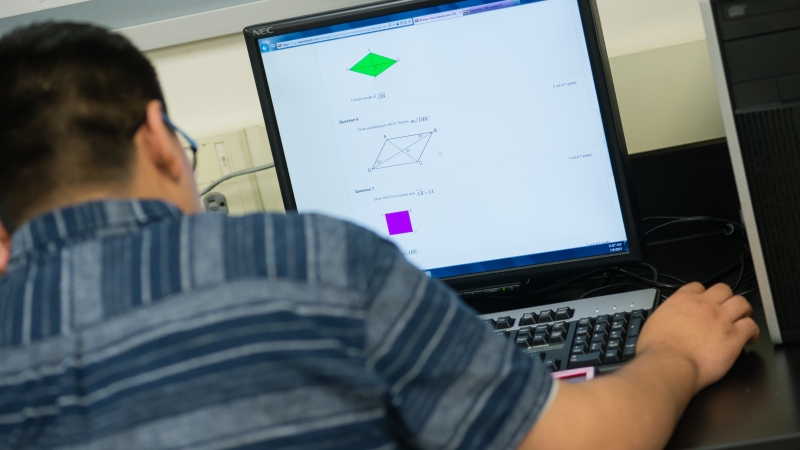
Earning a General Education Certificate
You can save money and create a foundation for postsecondary success.
FCPS and Northern Virginia Community College (NOVA) signed an agreement in 2013 for students to use a combination of high school and college courses to earn a General Education Certificate. At least 25 percent of the requirements (or 8 credits) must be earned through dual enrollment courses or courses taken through the college and the student must meet NOVA dual enrollment admissions requirements. The certificate provides a solid foundation for the first year of an associate of science degree and allows students to save on college costs. Students who complete the certificate will earn a minimum of 33 college credits.
The transferability of these credits is based on agreements NOVA has with partner universities or an individual university policy. NOVA articulation and guaranteed admissions agreements are available at: http://www.nvcc.edu/current-students/transfer/agreements/.
With the exception of SDV 100, all concurrent courses listed below can be used towards high school graduation requirements as long as a student receives permission from their high school prior to enrolling in the course and takes two semesters (or the equivalent) of college courses to transfer back a full year’s worth of high school credit. NOVA offers additional courses that can be used to earn the General Education Certificate; however, those courses are not eligible for high school credit. Students who wish to pursue the General Education Certificate should consult with their high school counselor.
Certificate Requirement |
Minimum College Credits Required |
College/ Concurrent Enrollment Option |
FCPS Dual Enrollment Option |
AP Options* |
IB Options** |
|---|---|---|---|---|---|
|
College Success Skills |
1 |
||||
|
College Composition I & II |
6 |
ENG 111 and one of the following: |
English 12 DE |
AP English Language and Composition AP English Literature and Composition |
IB English A Literature HL |
|
Math for Liberal Arts (or higher level math) |
3 |
MTH 163 and MTH 164 MTH 166 |
Precalculus with Trigonometry DE |
AP Calculus BC AP Statistics |
IB Math HL |
|
Physical or Life Science Elective with Lab |
8 |
BIO 101 and BIO 102 BIO 141 and BIO 142 |
Human Anatomy DE Geosystems DE |
AP Biology AP Chemistry AP Physics B AP Environmental |
IB Biology HL IB Chemistry HL IB Physics HL |
|
Humanities or Fine Arts |
6 |
ENG 243 ENG 279 ASL 201 and ASL 202 ASL 208 and ASL 210 ASL 261 and ASL 262 FRE 201 and FRE 202 GER 201 and GER 202 HIS 111 and one of the following: HIS 101 or HIS 243 |
AP French Language and Culture AP German Language and Culture AP Latin AP Spanish Language and Culture AP Art History AP Music Theory AP World History |
IB French B HL IB German B HL IB Spanish B HL |
|
|
Social/ Behavioral Sciences |
9 |
ECO 110 and ECO 120 HIS 111 and one of the following: HIS 101, HIS 203,HIS 231,HIS 243, HIS 251,HIS 253 HIS 112 and one of the following: HIS 102, HIS 135,HIS 232,HIS 252, HIS 254 HIS 121 and HIS 122 |
US Government DE Economics and Personal Finance DE |
AP US History AP US Government AP Macro Econ AP Micro Econ AP Human Geography AP Psychology AP Comparative Government AP World History |
IB Psychology IB History of the Americas IB Economics |
# Course cannot be used for a high school credit.
* See AP Credit Transfer Policy for Northern Virginia Community College for exam score requirements. If a student is planning to transfer to a four-year college or university, a higher score may be required by the four-year institution to receive credit.
** IB courses listed are taught over a two year period. See IB Credit Transfer Policy for Northern Virginia Community College for exam score requirements. If a student is planning to transfer to a four-year college or university, a higher score may be required by the four year institution to receive credit.





